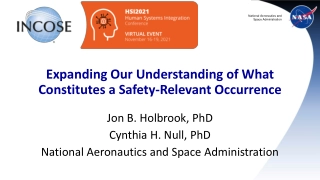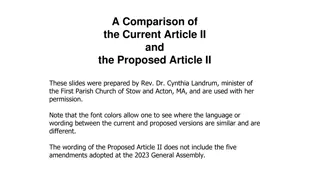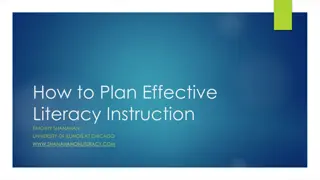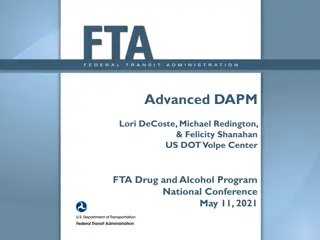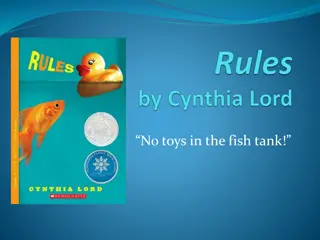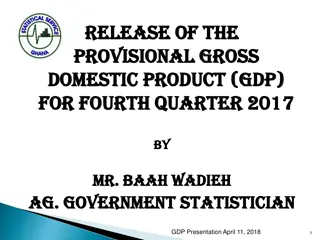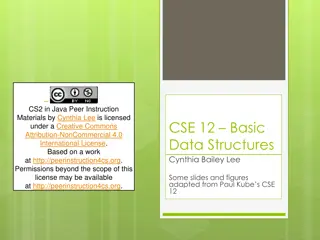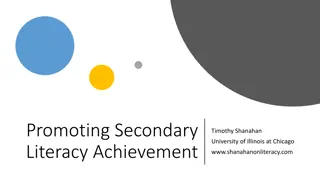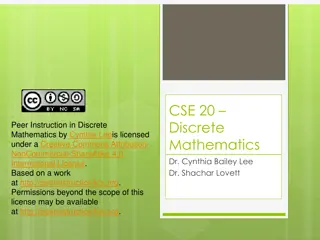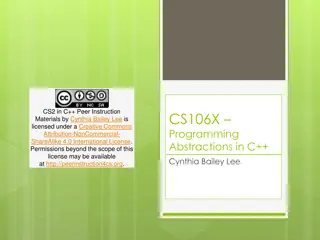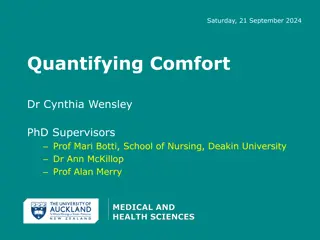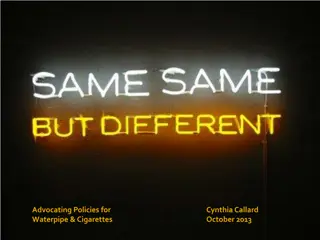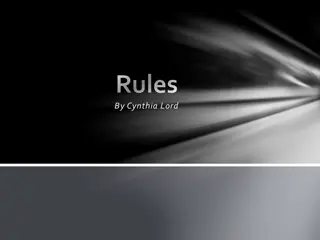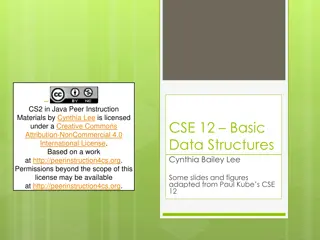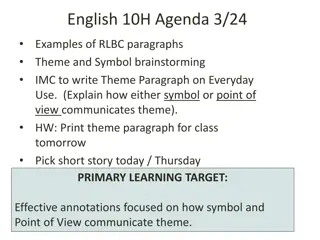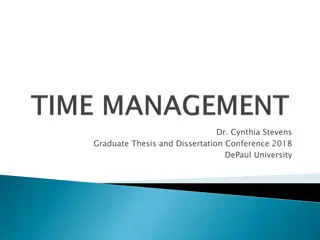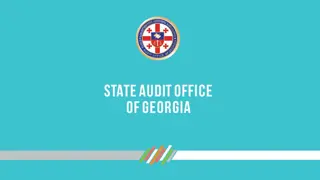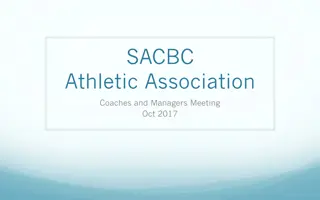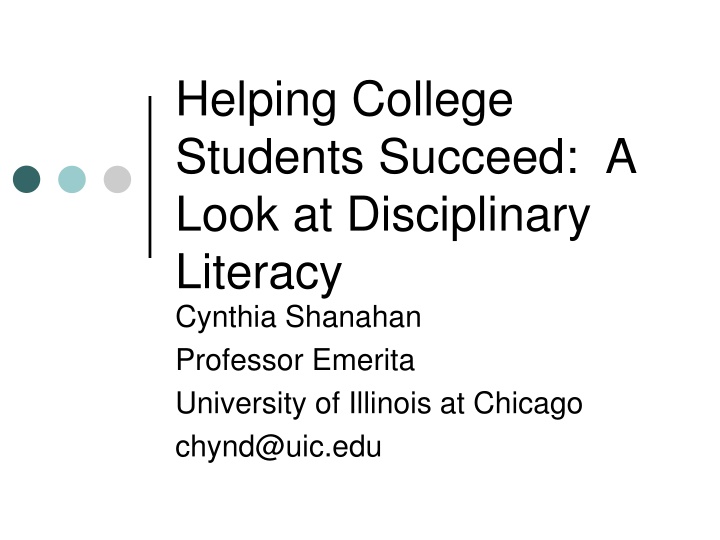
Enhancing College Students' Success through Disciplinary Literacy Insights
Explore the challenges and strategies for helping college students succeed academically, focusing on disciplinary literacy. Discover why traditional approaches like Developmental Education may fall short, and learn about potential reasons students struggle to apply strategies taught in class to their regular coursework. Gain valuable insights from a seasoned educator's observations and discover new approaches aimed at improving student outcomes.
Download Presentation

Please find below an Image/Link to download the presentation.
The content on the website is provided AS IS for your information and personal use only. It may not be sold, licensed, or shared on other websites without obtaining consent from the author. If you encounter any issues during the download, it is possible that the publisher has removed the file from their server.
You are allowed to download the files provided on this website for personal or commercial use, subject to the condition that they are used lawfully. All files are the property of their respective owners.
The content on the website is provided AS IS for your information and personal use only. It may not be sold, licensed, or shared on other websites without obtaining consent from the author.
E N D
Presentation Transcript
Helping College Students Succeed: A Look at Disciplinary Literacy Cynthia Shanahan Professor Emerita University of Illinois at Chicago chynd@uic.edu
Where the field has been. Developmental Ed, in the aggregate, hasn t done so well at helping students graduate from college Higher rates of attrition than regularly admitted students Hard on students who have to pay extra tuition and take extra time to graduate Students end up doing no better than the similar students taking regular classes
Learning Assistance Centers Provide some measures of success Stay in course and do better More likely to make it to the next term AND YET Overall 6 year completion rate is only around 60%, lower for males, and only around 40% for low-income students
What weve tried Letting students take regular classes at the same time as developmental ones. Giving students university credit for taking developmental courses Teaching reading and study strategies using real subject matter texts Pushing strategy instruction into regular classes (e.g. weekly seminars) Teaching integrated reading and writing developmental courses Co-teaching English courses Providing learning and assistance program tutoring for difficult classes
What Ive observed In 20 years teaching Developmental Ed in a progressive program that had many of the features noted in the last slide, I observed that, still Students were capable of learning and applying strategies to subject matter text Students didn t see the relevance of applying those strategies in their regular coursework.
Some possible reasons Task differences/text differences- making strategy usage far, not near tasks. Differences in purpose students weren t understanding the purposes for reading. My one size fits all toolbox of strategies weren t cutting it!
Going into regular classrooms, I found Vast differences in task (and teacher expectations) and text across different subject matters, and fewer differences within the same subject matter. I did studies of physics learning and history learning, which were very different Later Tim Shanahan and I studied experts the disciplines, finding key differences. The disciplines valued different kinds of knowledge, different ways of thinking about it.
My conclusion Need to focus on teaching students to read using processes grounded in the disciplines in which they are reading (and writing). The goal would be to bring students into those disciplines so that they understand what disciplines do and how they go about doing it.
Research Evidence Suggests that we need to focus more on the differences across disciplines rather than their similarities. Evidence comes from Expert studies, Expert-Novice studies, and Expert-Expert studies (Bazerman, Shanahan and Shanahan, Wineburg, etc.) Functional Linguistics (Schleppegrell, Halliday) Instructional research(Hynd-Shanahan et al, Moje, Greenleaf, De la Paz, etc.)
How are disciplines different? Four examples Purpose and source of information Author (and his circumstances) as an interpretive tool Role of graphics Types of vocabulary
Purpose and source: History To create interpretations of the past based upon multiple, often conflicting evidence from the historical record and the writings of other historians. They don t believe they are creating Truths; rather, they try to create plausible accounts and interpretations of the past based upon the evidence.
Purpose and source: Science To create knowledge about the world through systematic observation and experimentation of the natural world. To accurately use research methodology to get precise results in order use findings to solve real-world problems. To accurately describe processes. (Scientists need to engage in replication). To determine the probability of the same results given the same circumstances.
Purpose and source: Mathematics To solve practical and theoretical problems using principles of logic and systematic reason The source is this reasoning. To create a Truth: To find the complete answer without error.
Purpose and Source: English To illuminate the human condition through creation of artificial worlds that exist in their imaginations. They strive to create insights. That is, they want to create possibilities of meaningful connections with readers that say something about the human condition.
Author as an Interpretive Tool Not important Important History English Science Math English
Author as Interpretive Tool: History Knowing the source (the author and his/her political stance or cultural influences) helps determine perspective Knowing the time period in which something takes place and the reasons for writing places the text in an appropriate historical context. Historians use these understandings in reading to verify (or trouble) that perspective.
Author as Interpretive Tool: History I saw, oh I don t know him very well, but he [the author] is part of a right wing group of southern conservatives who is a secessionist. I m not sure that the best model for thinking about Lincoln as a president is one that comes from a racist. So I have my critical eyes up a little bit, so it s a bit of a stretch to be friendly to, so I wanted to make sure to read it fairly.
Author as Interpretive Tool: Science Authorship and source important only if it helps readers decide if a text is worth reading. Try not to attend to these things when reading. More likely to choose texts Written by well-known research scientists and well-equipped lab In respected journals (such as Nature) That are up to date
Author as Interpretive Tool: Scientists Yes. I pay attention in two ways: who wrote it and what is their affiliation, to see, is this somebody I recognize in the field, and also, I suppose, where the affiliation is, which, right or wrong, gives more or less credibility. If it s from a third world country, it may have a little less, I d read it with a little more suspicion than if it came from a highly ranked university. I look to see who is the individual and see whether or not I ve encountered their research in the past.
Author as an Interpretive Tool: Mathematics Mathematicians should try not to pay attention to the author or the time period in which something is written. Solutions to problems are timeless Read for adherence to principles of logic and absence of error not perspective, or trustworthiness/ expertise of author
Author as Interpretive Tool: Mathematics Yes, it s interesting (who the author is), but it doesn t really matter. The title and what I know of the review of these papers tells me that these methods are interesting to me. I don t care whether this person has name recognition or not.
Author as an Interpretive Tool: English Literature Traditions determine role of author New Criticism: No attention paid to author or context One reads much like a mathematician. Reader Response: No attention paid to author or context One reads for personal connections. Scholarly Reading: Much attention paid to author and context One always reads with these in mind.
Stopping By Woods Whose woods these are I think I know His house is in the village though; He will not see me stopping here To see his woods fill up with snow. My little horse must think it queer To stop without a farmhouse near Between the woods and frozen lake The darkest evening of the year.
Stopping by Woods He gives his harness bells a shake To ask if there is some mistake The only sound s the sweep Of easy wind and downy flake: The woods are lovely, dark and deep, But I have promises to keep, And miles to go before I sleep, And miles to go before I sleep.
Role of Graphics: History Supplemental to text Most of the time, graphics can be ignored and the text will still make sense. Historians do not want them to be ignored, however. They want students to critique them in the same way they do text.
Five-man drafting committee presenting their draft to Congress on June 28, 1776, not the signing of the document Only shows 42 of the 56 signers Some in the picture did not sign Benjamin Harrison V was replaced by his son The men in the painting had never all been in the same room at the same time.
Role of Graphics--Science Graphics are integral to understanding of the texts. Scientists want students to read the graphics and text reciprocally to move back and forth between them to get a full understanding of the scientific phenomena being discussed.
Role of Graphics: Mathematics Mathematicians embed numbers and graphic elements (e.g. charts of variables) into prose to explain mathematical concepts. They want students to flexibly use different reading processes as these are encountered.
The law of Inverses There are two pairs of inverse operations. Addition and subtraction and multiplication and division. To solve an equation we must isolate the unknown, x, on one side of the equation. ax b + c = d We write the numbers on the other side using the inverse operation ax + c = d = b ax = d = b c x = d + b c a
Role of Graphics: Literature Graphics rarely utilized in literature (occasionally, adult texts have widely spaced illustrations). Exceptions are children s literature and graphic novels, where the illustration carries a heavier load in interpretation Sometimes illustrations constrain interpretation/imagination
Stopping By Woods Whose woods these are I think I know His house is in the village though; He will not see me stopping here To see his woods fill up with snow. My little horse must think it queer To stop without a farmhouse near Between the woods and frozen lake The darkest evening of the year.
Stopping by Woods He gives his harness bells a shake To ask if there is some mistake The only sound s the sweep Of easy wind and downy flake: The woods are lovely, dark and deep, But I have promises to keep, And miles to go before I sleep, And miles to go before I sleep.
Types of vocabulary: History Vocabulary is about time, place, manner, event. Metaphorical terms Ex: The Gilded Age. Vocabulary can signal a political point of view Civil War; War Between the States; War of Northern Aggression Revolutionary movements in Europe and Asia were described to the American public as examples of Soviet Expansionism . (Zinn, A People s History)
Types of Vocabulary: Science A lot of technical terms where meaning can be retrieved (universally) by knowing the meanings of prefixes, suffixes, and roots. Ex: DNA deoxyribonucleic acid Words lack perspective/emotion Nominalizations Ex: Distill becomes distillation
Types of Vocabulary: Science Long noun phrases with embedded meanings Glass cracks more quickly the harder you press on it. Cracks in glass grow faster the more pressure is put on. Glass crack growth is faster if greater stress is applied. The rate of glass crack growth depends on the magnitude of the applied stress. Glass crack growth rate is associated with applied stress magnitude. (Halliday, 2004)
Types of vocabulary: Science Words in one s general vocabulary can have specific scientific meanings Ex: Paroxysm Literature: a sudden outburst of emotion or action: a paroxysm of laughter Medicine: a sudden onset of a symptom or disease, especially one with recurrent manifestations such as the chills and rigor of malaria.
Types of Vocabulary: Mathematics Technical vocabulary Technical terms already introduced used in definitions of new terms. A linear equation is a polynomial of degree 1. Precise definitions ( the is not the same as and ) Like in science, general words have specific meanings (e.g. prime ) Words lack perspective or emotion
Types of Vocabulary: English General academic words Words convey emotion, sensation, psychological state oEx.where I would have lived through all that impassioned, insane joy of the hunt, when as I climb the rock, my face contorted, gasping, shouting voluptuously senseless words (Nabokov, Father s Butterflies)
Implications We need to do more than just teach students to succeed in English classes We need to do more than teach students a toolbox of strategies We need to rethink what it would mean to help students do well in all of their college level classes.
Discipline-specific example: English What is main character like at the beginning of the story? What is the main character like at the end of the story? How has he or she changed? Crisis Given this character change, what do you think the author wanted you to learn? ________ ________________________________________________________________________ ________________________________________________________________________
Discipline Specific Example: Chemistry Atomic Expression Substances Properties Processes Interactions
Discipline specific example: History R. Kennedy report to Dean Rusk, Secretary of State He (Dobrynin) then asked me about Khrushchev s other proposal dealing with the removal of missiles from Turkey. I replied that there could be no quid pro quo no deal of this kind could be made. This was a matter that had to be considered by NATO and that it was up to NATO to make the decision. I said it was completely impossible for NATO to take such a step under the present threatening position of the Soviet Union.... I repeated that there could be no deal of any kind and that any steps toward easing tensions in other parts of the world largely depended on the Soviet Union and Mr. Khrushchev taking action in Cuba and taking it immediately.
History, cont. Dobrynin Report to Russian Foreign Minister: If that (the missiles in Turkey) is the only obstacle to achieving the regulation I mentioned earlier, then the president doesn t see any insurmountable difficulties in resolving this issue, replied R. Kennedy. ... However, the president can t say anything public in this regard about Turkey, R. Kennedy said again.
History Events Chart TEXT WHO? WHAT? WHERE? WHEN? WHY? 1 Relation: 2 Relation: 3 Relation 4 Main point:
Implications Teaching students to succeed in their discipline-based classes means teaching them something about the discipline in which they are reading.
Thanks. Cynthia Shanahan Professor Emerita University of Illinois at Chicago chynd@uic.edu 312-593-3698 Shanahanonliteracy

